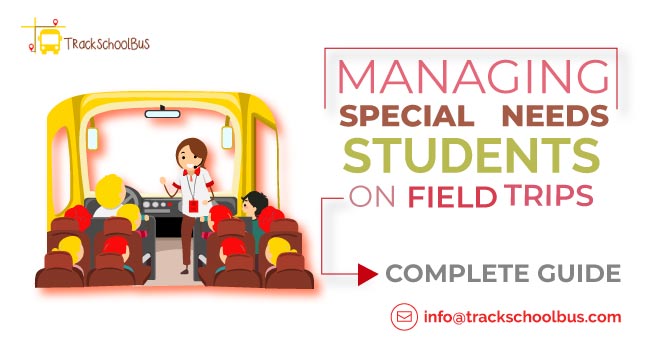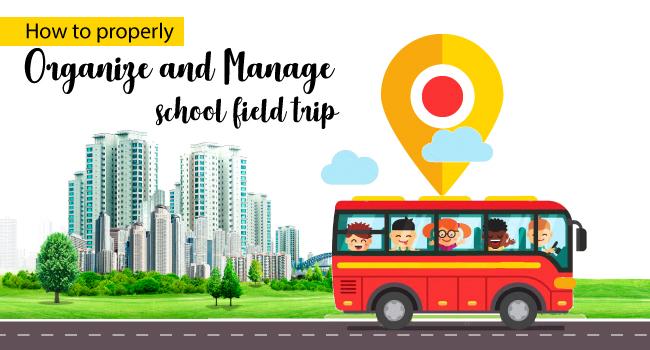Field trips are immense and enriching, teaching the child what goes on outside the classroom is of great educational value. They learn important skills such as safety, social interactions and flexibility.
Planning and executing a field trip for special needs students is a daunting task. Innumerable factors have to be considered for the trip to be safe, smooth and enjoyable.
Managing special need students on field-trip rests solely on prior planning and preparation. Taking them on field-trips becomes stress-free for both child and teacher when this is done in detail.
Read Also: Guidelines for Transportation of Students with Special Needs
1. Planning
1. Deciding on a suitable location
A location should be thoughtfully chosen to derive the maximum benefit. Children going on field-trips are of different ages and in different stages of development. So locations which suit their interest and aptitude need to be chosen.
Special needs students have shorter attention spans. They might not be able to sit for long in buses. The trip duration will have to be limited to a few hours as day-long trips might tire them. A location where all students can go has to be selected.
Places where they can have real time visual and physical experience like farms, zoos and gardens will be safe and interesting options. Activity -oriented field trips to science centers where they can interact with simple equipment should be considered.
These centers allow them to touch, feel and experience something new. Trips to supermarkets, grocery stores or book shops may be considered depending on the student capabilities.
2. Obtaining required permits
School district administrators need to approve of the trip. They need to assure that the trip is age appropriate, safe and enhances the curriculum. Schools have to adhere to regulations and policies stipulated by them.
3. Pre-visit to the location
It would be ideal if the school authority or concerned teacher could visit the locale prior to scheduling the trip. An assessment of the child-friendly facilities available at the place can be done.
Availability of the wheel-chair ramps, easy bathroom access, toilet paper, food stalls for handicapped is to be checked. Any addition in services required, like requests for extra wheel-chair
4. Locality assessment
Awareness of the police stations, hospitals, Para-medical services and fire stations around the location of field-trips is necessary. The teachers on duty should be provided with a list of essential services and their contact telephone numbers nearest to the place of the trip.
This will prove extremely useful in case of emergency. In the event of any mishap, they can contact the services directly instead of waiting for help from the school. This will save time and ensure quick and prompt action.
5. Parent approval
Parents are informed of the nature of the trip, time and date. A written approval from the parent has to be obtained for their ward to be included in the trip.
2. Accompanying staff
1. 1:1 ratio:
As the needs of special children vary, each child has to be given constant individual attention. It is suggested that on field trips it would be ideal to have a one-on-one aide i.e. a teacher for each student.
This will make the child feel comfortable. The teacher will be relieved of monitoring an entire group. Undue strain causes both children and teacher to be stressed.
2. Parents
Parents can be asked if they would like to escort their wards. This option would be highly beneficial to all. Children feel more secure with their parents in an unfamiliar environment. This reduces child distress. Parent experience the safety of the child. This reduces their anxiety.
Parents can be asked if they would like to escort their wards. This option would be highly beneficial to all. Children feel more secure with their parents in an unfamiliar environment. This reduces child distress. Parent experience the safety of the child. This reduces their anxiety.
Parents can be asked if they would like to escort their wards. This option would be highly beneficial to all. Children feel more secure with their parents in an unfamiliar environment. This reduces child distress. Parent experience the safety of the child. This reduces their anxiety.
Parents can be asked if they would like to escort their wards. This option would be highly beneficial to all. Children feel more secure with their parents in an unfamiliar environment. This reduces child distress. Parent experience the safety of the child. This reduces their anxiety.
3. Volunteers and Buddy program
Some schools run buddy programs. A student, volunteer or teacher is assigned to the special need child as his/her buddy. The buddy spends time with the child,
A buddy as an escort will make the child feel safe, secure and comfortable. Community welfare volunteers can be requested for their services if necessary.
4. Nurse
A qualified school nurse has to be in attendance on the trip. First-aid essentials are a must. Medications for insect bites, allergies etc have to be ensured. Nutritional needs of the children are of concern and should be provided.
Read Also: 10 FAQs About Transporting Students With Special Needs
3. Consolidated Data Sheet
1.Student database
A comprehensive database with the list of special needs children on the field-trip is prepared. This will list the names, ages, parents name and address, contact numbers and emergency numbers. In addition to this, each child’s specific disabilities are listed.
2. Dietary needs
Pre-caution has to be taken while providing the children with the food and drinks especially from public outlets. Special needs students have specific diets to be followed.
Anything out of the norm might upset their systems and result in uneasiness. It would be better if the children could bring their food packs from home. This would help in preventing the
3. Food allergies
The
The data-base should list specific food allergies of the students. In instances where the school decides to provide the meals, this has to be taken into account.
4. Insect allergies
The parents should inform the school of any allergy their child is prone to like insect bites, grass, hay
The parents should inform the school of any allergy their child is prone to like insect bites, grass, hay
The copy is given to all accompanying the students on the trip – teachers, escorts, nurses and bus drivers. A copy is left at the school.
Parents, if not accompanying, are given the telephone numbers of the teachers and bus drivers on the trip.
4. Preparation
1. Special needs children
Special needs students often do not feel comfortable when they are faced with a new environment. They are used to set timetables and regulated normal daily routines.
They find it difficult when their day to day schedules are disrupted. They do not know how to face situations alien to them. So preparing them for a field trip is the key to reducing their anxiety.
A pictorial itinerary of the trip can be shown to them. A step by step enactment of how they will arrive at each step and how they have to behave at each stage would be helpful.
Answering queries from them will allay their fears. Familiarizing them for a week leading to the trip would help to reduce their anxiety and discomfort.
The student has to be prepared for the whole day of the trip. They have to be taught to request breaks and to convey discomfort.
The students have to be told who their escort or buddy would be. Pictures of them can be shown. They have to be educated on what the buddy/escort would do for them.
The students will have to be rewarded throughout the trip to motivate them. Positive reinforcement techniques will have to be applied before and after the trip.
2. Parents
Parents of special need children are anxious about them being taken to places outside the school environs. They are called to
They are educated on how the trip will give their ward a different learning experience. This will enable the parent to mentally prepare the child for his
Parents can send the child’s favorite snack which he/she can eat without being messy. Plenty of water should be provided.
5. Safety aspects
1. Transportation
Special needs students on a field trip should be transported only by school transport. Children should not be transported in private cars.
2. Identity tags
The children should be tagged with identity badges or bracelets showing their identity and contact details.
No amount of planning can eliminate the challenge of taking special need children on fieldtrips. The threshold level of special needs children is lower than normal. Their attitudes and moods change fast.
Read Also: How to Transport Special Needs Students on School Bus
Things may not work out as planned and changes need to be allowed. Some students run away, throw tantrums when they are under stress. These significant issues will make it complicated for the teachers. Hence fluidity in plans is required.
Field trips and special need children seem to be an impossible combination. Proper planning, preparation and an open mind can tremendously help in organizing safe and productive field-trips for special needs students.


